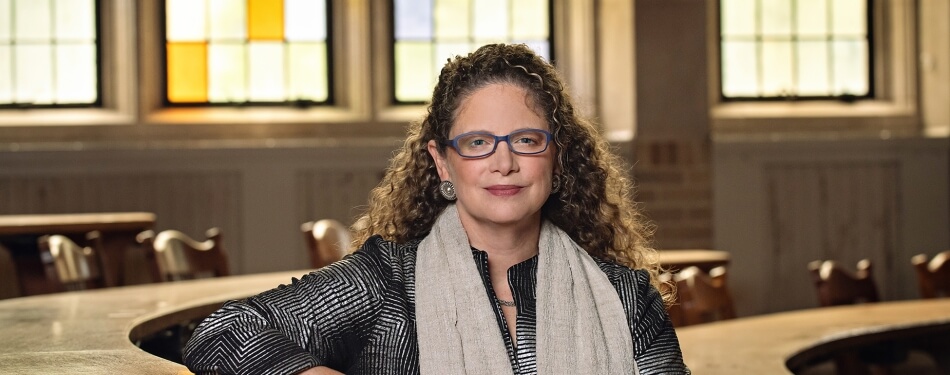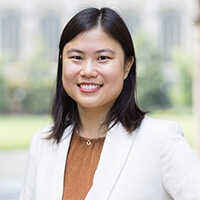Conditions for women in Afghanistan have deteriorated so badly that the situation constitutes a form of apartheid, according to Karima Bennoune, ’94, the Lewis M. Simes Professor of Law. And just as the legal community stepped up to help end racial apartheid in South Africa, now it faces a clear obligation to do the same in Afghanistan, she argues.
In a new paper in the Columbia Human Rights Law Review, Bennoune writes that the situation in Afghanistan since the 2021 takeover by the Taliban amounts to literal apartheid, an international crime. This “gender apartheid” goes beyond separation to establish a system that maintains the inferiority of women, she notes.
“Women and girls are excluded from university and secondary schools. The Taliban have banned women from many areas of employment, including with the United Nations. They have banned birth control and are reportedly enforcing the ban by threatening pharmacies and midwives,” Bennoune explained. “Women’s freedom of movement is curtailed; the Taliban have banned driver’s licenses for women, and women are not allowed to travel farther than 45 miles without a male legal guardian. Women and girls are banned from sports, parks, gyms, public baths. Finally, when women protest these kinds of restrictions, they face arrest, torture, ill treatment, incommunicado detention, and sometimes even detention with members of their families.”
Bennoune’s work is part of a global campaign to draw attention to gender apartheid in Afghanistan and demand that the international community take action to end it. The campaign has drawn widespread media attention, and Bennoune has participated in many events organized by human rights organizations and academic institutions inspired by her paper, including one hosted by the Women in International Law Interest Group of the American Society of International Law on International Women’s Day March 8.
Bennoune recently answered a few questions about the issue:
Why is it important that we use the term “gender apartheid” in reference to Afghanistan?
This label has many different kinds of significance: legal, political, popular, campaigning, and rhetorical. Legally speaking, apartheid is an international crime, and there is a prohibition on complicity with and acquiescence to apartheid. All of those legal consequences are critically important for ending gender apartheid. I very much support the new global campaign that was launched on International Women’s Day to have gender apartheid recognized as an international crime. This helps us to understand apartheid as a situation that is illegal and needs to be ended, instead of addressed with piecemeal “constructive engagement,” which will not work.
The paper makes a case that ending Afghanistan’s gender apartheid rises to the level of an obligation, as something that must be done. Where does that obligation come from?
One, the 21st Century is the first time when states have agreed on a target date, 2030, by which to end gender inequality. Governments set that date when they adopted the United Nations Sustainable Development Goals. My argument is that it is impossible to achieve this goal without ending gender apartheid.
Two, the prohibition on discrimination on the basis of sex—which was the terminology used at the time—is included in the UN Charter, along with the prohibition on discrimination on the basis of race and some other forms of discrimination. So it is equally central to international law and part of the foundations of the UN system.
What is the single biggest counterargument, and how do you respond to that?
The most basic one is the idea that there is no explicit textual support in international law for recognizing something called gender apartheid. What I argue is that the existing standards on apartheid can and should be interpreted in a 21st-century way so as to include gender apartheid. All you have to do is take the relevant definition of apartheid and insert the word “gender” or “sex” alongside race. There’s precedent for updating our interpretation of international law in this way.
To be clear, I didn’t invent this approach by myself. Many people are thinking along these lines. It was very important to me to cite a prominent Black South African woman legal scholar who supports this approach, Penelope Andrews. She is the first Black woman to be a dean of a law school in South Africa. I think the fact that she agreed this substitution was not only appropriate but would lead to enhanced responses to the situation of Afghan women, and she also suggested this in her own scholarship, was a very important piece of support.
What has been the reaction to the paper so far?
Beyond my wildest imagination. I’ve been absolutely thrilled at the way that the paper has been embraced, first by Afghan women advocates themselves. For this paper, I carried out a set of remote interviews with Afghan women human rights defenders, many of whom had just been evacuated or were still on the ground in Afghanistan and were subsequently evacuated. It was important to me that they were participating in this research, they were not just objects of it. And of those I interviewed, all but one agreed with the characterization of the situation in their country as gender apartheid.
Since the paper was published, I’ve been invited to speak widely, including at the Afghan Institute for Strategic Studies and at the American Society of International Law Annual Meeting, and to participate in a consultation with Afghan human rights defenders and the UN special rapporteur on the situation of human rights in Afghanistan. I have talked to civil society advocates on the frontlines, and I have talked to very high-level people, sometimes in confidential settings. There has been a great deal of interest, and it has been exciting to see all the high-level voices who are now using this term.
I have been working to encourage more governments to use this language in their statements about Afghanistan and to insert this language—and the legal consequences that go with it—into resolutions on Afghanistan, perhaps beginning at the level of the UN Human Rights Council. Beyond the global campaign on gender apartheid that was launched on International Women’s Day, there’s a long list of consultations that I’m going to be participating in going forward.
But ultimately, what matters most is not that people say these “magic words,” gender apartheid; what matters most is that states and other actors effectively fulfill all the legal obligations that come with using the apartheid framework, which is the requirement to take concerted, effective action to end an illegal situation. That’s the long-term goal.
Are there things that interested, concerned individuals can be doing to help further the cause?
It really depends on the context in which people are working. Certainly, for lawyers, there’s a lot of room for innovative litigation, both at the international level and domestically. One of the things the campaign calls for is changing domestic law around the world to incorporate the concept of gender apartheid, citing gender apartheid as a basis for sanctions, and so on. There are interesting cases that could be brought, including by encouraging the prosecutor of the International Criminal Court to do so, although there’s some work to be done to make that happen because the Court’s Rome Statute uses the 20th-century definition of apartheid. There is a lot of room for lawyers to submit cases from Afghanistan that document the reality of gender apartheid to the mechanisms that make up the UN human rights system.
Also: Inviting Afghan women human rights defenders to speak, translating things that they write, and helping get those things published and shared. Unfortunately, there is also still a huge amount of work in the immigration area—supporting Afghan women in their asylum cases around the world. I hope that the United States will follow the very courageous lead of countries that have decided that Afghan women as a group are entitled to asylum, given the nature of the gender apartheid regime. People can advocate for that in the United States.
Finally, I would ask people to consider sharing the article and sharing the fact sheets that are available in my Twitter feed that I prepared with Michigan Law Student Amulya Vadapalli, ’23. But most importantly, to share the words of Afghan women themselves. They are calling for principled responses to the ever-increasing restrictions they face, including the terrible new ban on women working for the UN.







